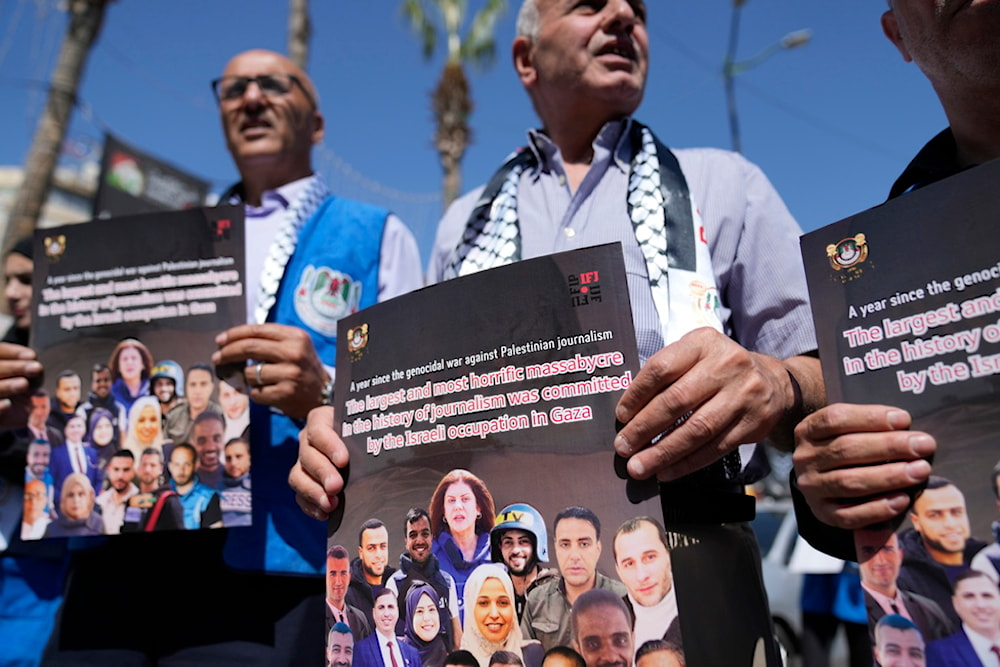'Israel’s' assault on press freedom unprecedented, Chris Hedges writes
According to the renowned US journalist, "Israel's" restriction on foreign journalists entering Gaza and its pattern of targeting local Palestinian reporters reflect a broader assault on press freedom.
-

Palestinian journalists hold posters during a protest ahead of the one year anniversary of the war on Gaza, in the West Bank city of Ramallah Sunday, Oct. 6, 2024. (AP)
The Scheerpost on Saturday published an analysis by renowned American journalist and writer Chris Hedges, offering a stark examination of the perilous climate for journalists covering the war on Gaza.
Hedges delves into the contrasting realities faced by foreign reporters in "Israel," who he argues are often steered by military-guided narratives, and Palestinian journalists in Gaza, who sacrifice their lives to tell the unfiltered truth.
The article presents a powerful critique of how foreign media correspondents, largely confined to Israeli-controlled narratives, cover the war from luxury hotels and under strict Israeli military oversight.
Meanwhile, Palestinian journalists face daily, life-threatening conditions to fill the gaps left by the international media's absence in Gaza, Hedges points out.
Read more: 'Israel' kills Palestinian journalist in Gaza, death toll reaches 170
Assault on press freedom
According to Hedges, "Israel's" restriction on foreign journalists entering Gaza and its pattern of targeting local Palestinian reporters reflect a broader assault on press freedom.
He cites alarming statistics from the Committee to Protect Journalists, noting that at least 128 journalists and media workers across Gaza, the West Bank, and Lebanon have been killed and 69 detained, marking the deadliest period for journalists since the organization began collecting data in 1992.
Hedges juxtaposes this grim reality with foreign correspondents' tightly-controlled access, including guided visits to alleged Hamas sites and daily Israeli press conferences that are often riddled with misinformation.
These "hotel room warriors," as Hedges calls them, relay the Israeli narratives without truly witnessing the realities on the ground.
He calls out this domesticated media as serving the interests of military powers, suggesting they become "spokesmen of the spokesmen."
International silence on press suppression
The piece also highlights broader international complicity, particularly focusing on the role of the United States.
Hedges argues that the US government's silence on press suppression in Gaza implicitly endorses the targeting of journalists, drawing parallels to its history of media control and disinformation in previous wars.
Citing US influence over global narratives, he refers to a recent open letter signed by 70 media and civil society organizations urging "Israel" to permit foreign journalists in Gaza — a request that has been met with silence.
Read more: 113 journalists send letter to Blinken, demand Israeli arms embargo
Hedges calls for a reevaluation of the role of journalists in war zones, urging them to stand as independent voices that confront power.
His analysis points to Palestinian journalists as embodying this resistance, risking their lives to counter narratives that obscure the depth of the humanitarian crisis.
Barrier against 'mass hypnosis'
For Hedges, these journalists are the last barrier against a "mass hypnosis" orchestrated by "Israel's" media management, with grave implications for freedom of the press globally.
The piece concludes with a grim prognosis: the suppression of real journalism, Hedges argues, sets a dangerous precedent.
With his unflinching portrayal of the targeting of journalists in Gaza, Hedges warns of the erosion of press protections and the normalization of totalitarian censorship, where “truth has a very short life expectancy.”

 3 Min Read
3 Min Read








